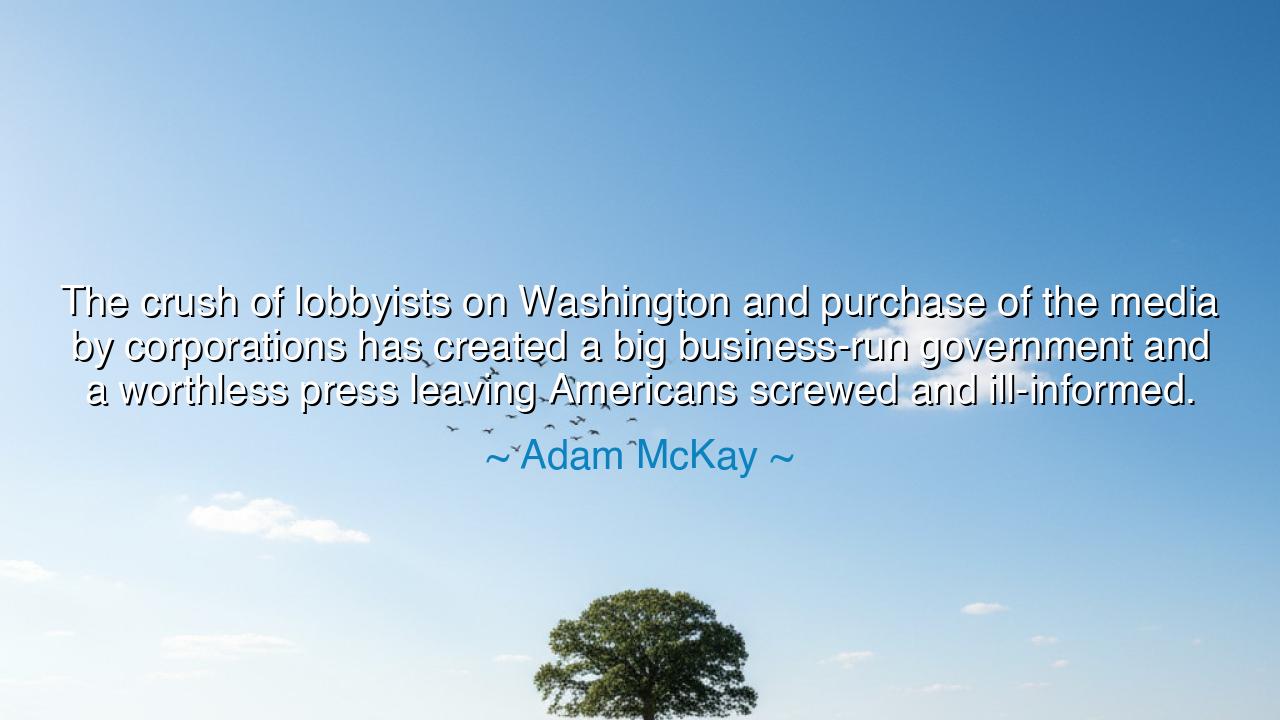
The crush of lobbyists on Washington and purchase of the media by
The crush of lobbyists on Washington and purchase of the media by corporations has created a big business-run government and a worthless press leaving Americans screwed and ill-informed.






The words of Adam McKay, modern satirist and truth-teller, ring with the fury of conscience and the sorrow of disillusionment: “The crush of lobbyists on Washington and purchase of the media by corporations has created a big business-run government and a worthless press leaving Americans screwed and ill-informed.” Beneath his anger lies a profound lament for a democracy drifting from its soul—a nation once built on the courage of free men and women, now entangled in the machinery of money and manipulation. McKay, though a filmmaker by trade, speaks here as a prophet of the age of information, warning that when truth becomes a commodity and power a purchase, the republic itself trembles.
At its heart, this quote is a cry against corruption disguised as civilization. McKay paints a portrait of a world where corporations have replaced kings, where lobbyists have become the courtiers whispering into the ears of rulers, and where the press, once the sacred guardian of the people’s knowledge, has been bought and silenced. In his words, we hear not the rhetoric of politics, but the anguish of a citizen who sees the light of truth dimming beneath the weight of greed. For when those who govern serve not the people but profit, and when those who inform the people are chained by the same masters, the result is a populace deceived—“screwed and ill-informed,” as he puts it with blunt, righteous honesty.
The origin of these words lies in McKay’s long career as a storyteller unafraid to confront hypocrisy. From The Big Short to Vice and Don’t Look Up, his art has become a mirror held before the face of power, revealing the absurdity and arrogance that often define it. This particular statement emerged not from a script, but from his deep frustration with the collusion between government, media, and corporate interests—a triangle of influence that shapes public opinion, policy, and even morality. McKay’s voice joins a lineage of thinkers and reformers, from Upton Sinclair to George Orwell, who warned that the corruption of information is the first step toward the enslavement of a free people.
History itself offers proof of McKay’s warning. Consider the Gilded Age of the late 19th century, when industrial titans—Rockefeller, Carnegie, and Morgan—wielded more influence over national policy than many elected officials. The press, fed by their fortunes, often praised rather than questioned their power. The result was a government beholden to wealth, and a public misled by illusions of progress. It took the bravery of muckrakers like Ida Tarbell and Lincoln Steffens, armed with the pen of truth, to pierce the veil of corruption and awaken the people. And yet, as McKay laments, the cycle has returned. Today, the corporate empire no longer builds steel or railroads—it builds narratives, buying the minds and hearts of citizens through media designed not to enlighten, but to distract.
McKay’s fury is not without purpose. He reminds us that a democracy cannot survive without an informed citizenry. When truth is filtered through profit, when headlines are shaped by shareholders, and when laws are written not in the halls of Congress but in the offices of lobbyists, the people become powerless. This is not merely the decay of politics; it is the erosion of reality itself. The citizen no longer knows whom to trust, what to believe, or where to turn. And in that confusion, tyranny thrives—not in the form of a dictator, but in the invisible hand that controls information. McKay’s words, therefore, are not merely a critique—they are a warning of spiritual warfare in the modern age: the battle for truth itself.
Yet his voice also carries a glimmer of defiant hope. For if corruption is organized, then truth too must organize. If the press has been purchased, then the people must become their own press—thinking critically, questioning boldly, seeking the uncomfortable truths that power seeks to bury. History has shown again and again that when the people reclaim their voice, even the mightiest empires of deceit crumble. It was public awakening that broke the chains of colonialism, that ended segregation, that toppled totalitarian regimes. The pen, the word, the voice—these remain weapons greater than wealth.
The lesson of McKay’s words, then, is both moral and practical: guard the truth as you would guard your freedom, for they are one and the same. Do not entrust your understanding of the world to those who profit from your ignorance. Read deeply, think independently, and hold your leaders—and your media—to account. Support the few voices of integrity that still dare to speak. And above all, refuse to be lulled into complacency by the comfort of illusion. For every age of corruption survives not because the wicked are powerful, but because the good are silent.
So let these words stand as a clarion call to all who love liberty: question everything, for questioning is the breath of democracy. Let every citizen remember that truth, once lost, is not easily reclaimed—and that freedom without truth is a ghost wearing the mask of justice. In the spirit of Adam McKay’s warning, awaken the mind, sharpen the conscience, and do not surrender your soul to the merchants of deceit. For when the people see clearly, no empire—of money, lies, or greed—can stand before them.






AAdministratorAdministrator
Welcome, honored guests. Please leave a comment, we will respond soon